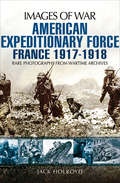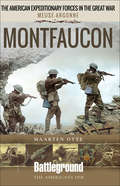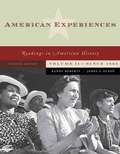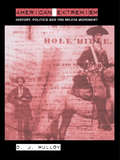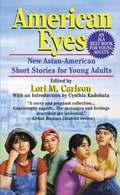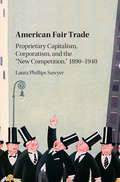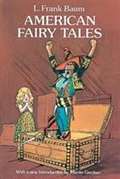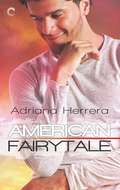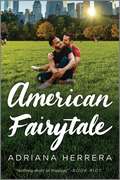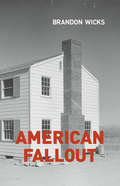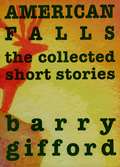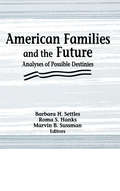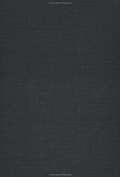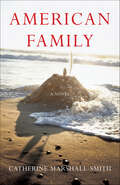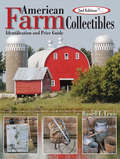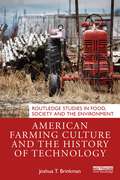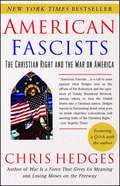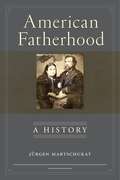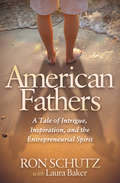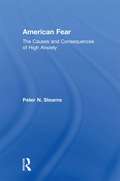- Table View
- List View
American Expeditionary Force: France, 1917–1918 (Images of War)
by Jack HolroydWhen the United States entered the war in April 1917 the belligerents were approaching exhaustion. It had been hoped by the Generals in both Britain and France that untold numbers of fresh troops would be assimilated into their respective commands. However, this idea was firmly resisted, America would field its own army alongside the Allies it would have its own section on the front line. Those with concerns that the untried divisions under General Pershing would fair badly against the seasoned German military machine were soon reassured as impressive victories were won by the newcomers. The book is split into eight chapters which deal with different pivotal moments during the First World War from the American perspective, from the reasons behind the American involvement in the war and initial training to the major battles at Cantigny, Chateau Thierry and St. Mihiel. This story is told in pictures gleaned from the official archives which were first published in 1920 and now presented for reexamination and public awareness in the Images of War series.
American Expeditionary Force: France, 1917–1918 (Images of War)
by Jack HolroydWhen the United States entered the war in April 1917 the belligerents were approaching exhaustion. It had been hoped by the Generals in both Britain and France that untold numbers of fresh troops would be assimilated into their respective commands. However, this idea was firmly resisted, America would field its own army alongside the Allies it would have its own section on the front line. Those with concerns that the untried divisions under General Pershing would fair badly against the seasoned German military machine were soon reassured as impressive victories were won by the newcomers. The book is split into eight chapters which deal with different pivotal moments during the First World War from the American perspective, from the reasons behind the American involvement in the war and initial training to the major battles at Cantigny, Chateau Thierry and St. Mihiel. This story is told in pictures gleaned from the official archives which were first published in 1920 and now presented for reexamination and public awareness in the Images of War series.
American Expeditionary Forces in WWI: Montfaucon (Battleground Books: Wwi Ser.)
by Maarten OtteAny visitor to the site of the bloodiest battle in the history of the United States will be drawn to Montfaucon, for it is here that General Pershing, the Commander in Chief, determined that the major memorial to the American Expeditionary Forces would be sited. The impressive classical column, erected on the summit of Montfaucon Hill, can be seen from many parts of the battlefield of the Meuse-Argonne 1918.The village of Montfaucon, perched on and around one of the most notable heights in the Argonne area, was a first day objective for the First American Army in its massive offensive that was launched on 26 September 1918 and which rumbled on until the Armistice.Montfaucon had been the scene of bitter fighting between the French and the Germans in the early stages of the war, finally staying securely in German hands. The attack started well, with the great numbers of Doughboys easily moving through the first line of the German defense system; and, indeed, good progress was made all along the front, even if final objectives were not attained that would have brought the Americans up to the Hindenburg Line defenses. The most notable setback was the failure to capture Montfaucon, an objective given to the 79th Division. Why the task of capturing this key part of the German line to a 'green' division, composed of draftees and which had only had six weeks or so of training time in France, instead of the prescribed three months, has never been adequately explained.What has proved to be controversial ever since is why the 4th Division, a regular formation that had already been engaged in battle on the Western Front and which gained its objectives on the first day, did not seek to assist the 79th when it was clear that it was facing significant difficulties in overcoming the Montfaucon defenses. The outcome was that the village and hill did not fall on the first day. How significant this setback was to the success and the duration of the offensive has also been the subject of considerable discussion.Montfaucon was an important observation point for much of the war, providing distant views over considerable amounts of ground and thus invaluable for the German artillery. How much its loss mattered to the Germans when fighting a defensive battle, with the defense lines south of it already lost, is more open to debate, given the vantage points that the Germans continued to enjoy from high ground to the north-west and east.Maarten Otte sets the importance of Montfaucon and the ultimately successful effort to capture it within a succinct narrative. In the tours section he takes the visitor on a number of routes so that they can see for themselves the problems on the ground that faced the 79th Division and puts Montfaucon in the context of the wider battle. He also provides a detailed tour of the village and hill itself, including the magnificent memorial and the preserved defenses and ruins which surround it.
American Experiences: Readings in American History (Volume II) (Seventh Edition)
by Randy Roberts James S. OlsonThis diverse and distinctive collection of secondary sources, written by a variety of authors, emphasizes social and cultural history.
American Express TRS Charge-Card Receivables
by Andre F. Perold Kuljot SinghAmerican Express (TRS) Co. is considering a proposal to securitize a portion of their consumer charge-card receivables portfolio. In the past, they have relied exclusively on a captive finance subsidiary, Credco, to perform this function. The proposed securitization structure has been put forth by Lehman Brothers and relies heavily on the existing structure of credit-card receivables' securitizations. The growing asset-backed securities market presents TRS an opportunity to diversify its sources of funds--however, there are reasons to be cautious. Due to recent downgrades of American Express and Credco debt, the perceived financial weakness of credit-card receivable backed securities issuers, and the proposal's sophisticated securitization structure, TRS is concerned that 1) The market may perceive securitization as a sign of weakness; 2) The securitization may not be cost effective. Therefore, TRS has to decide whether or not to proceed with securitization at this time.
American Express Travel Guide to San Francisco and the Wine Regions
by Brian EadsA guide to the city of San Francisco and the surrounding regions.
American Extremism: History, Politics and the Militia Movement (Extremism and Democracy)
by Darren MulloyAmerican Extremism explains how at the heart of the politics practiced by the militia movement is an attempt to define the nature of 'Americanism', and shows how militia members employ the myths, metaphors and perceived historical lessons of the American Revolution, the constitutional settlement and America's frontier experience to do so. Mulloy argues that militia members' search for the 'authority of history' leads them to a position best characterized as 'ahistorical historicism', in which political interests in the present are given greater weight than the demands of a historically accurate reading of the past.With discussion of such recent events as the Oklahoma City bombing, Waco and the September 11th attacks alongside topical issues including militia conspiracy theories and the origins of Americans' right to keep and bear arms, this work provides the deepest understanding to date of the American militia movement.
American Eyes: New Asian-American Short Stories for Young Adults
by Cynthia Kadohata Lori M. CarlsonHeartfelt short stories written by ten young Asian-American writers who share the conflicts that many young people feel living in two distinct worlds - one of memories and traditions, and one of today. Stories by Marie G. Lee, Ryan Oba, Katherine Min, Mary F. Chen, Lois-ann Yamanaka, Fae Myenne Ng, Cynthia Kadohata, Peter Bacho, Lan Samantha Chang, and Nguyen Duc Minh.
American Fair Trade: Proprietary Capitalism, Corporatism, and the 'New Competition,' 1890–1940
by Laura Phillips SawyerRather than viewing the history of American capitalism as the unassailable ascent of large-scale corporations and free competition, American Fair Trade argues that trade associations of independent proprietors lobbied and litigated to reshape competition policy to their benefit. At the turn of the twentieth century, this widespread fair trade movement borrowed from progressive law and economics, demonstrating a persistent concern with market fairness - not only fair prices for consumers but also fair competition among businesses. Proponents of fair trade collaborated with regulators to create codes of fair competition and influenced the administrative state's public-private approach to market regulation. New Deal partnerships in planning borrowed from those efforts to manage competitive markets, yet ultimately discredited the fair trade model by mandating economy-wide trade rules that sharply reduced competition. Laura Phillips Sawyer analyzes how these efforts to reconcile the American tradition of a well-regulated society with the legacy of Gilded Age of laissez-faire capitalism produced the modern American regulatory state.
American Fairy Tales
by L. Frank BaumIn Chicago, an ordinary key unlocks a magical trunk packed with robbers and a pie. In Boston, five magical bon-bons make an ordinary senator, an ordinary professor, an ordinary girl and her ordinary parents do the most extraordinary things! <P> <P> A young cowboy lassoes Father Time; the dummy in Mr. Floman's department store window comes to life; and a tiny beetle gives a New England farmer and his wife a pump which pumps not water, but gold! Author of the much-loved Oz books, L. Frank Baum transforms the familiar with his magical mix of humor and enchantment. Most of the twelve stories in this delightful collection are set in America where, so it seems, modern fairies, knooks, and ryls are always causing the most astonishing things to happen! These tales will enchant both young and old. When American Fairy Tales first appeared, Baum's reputation as a storyteller had already been established by The Wonderful Wizard of Oz, written in 1900. The twelve stories in this collection were originally syndicated weekly in at least five newspapers during the first half of 1901. The first book edition, which this facsimile reprints, came out later that year.
American Fairytale (Dreamers #2)
by Adriana Herrera“Herrera delivers an emotionally resonant, sensually charged second Dreamers contemporary (after American Dreamer) that will knock readers’ socks off.” —Publisher’s Weekly, starred review“With a superb understanding of human strengths and weaknesses, a genuine appreciation for the important role different cultures play in our world, a generous dash of sharp humor, and a real flair for crafting heart-tugging characters, Herrera continues her Dreamer series, following American Dreamer (2019), and puts her own sizzlingly sexy spin on the idea of a modern-day fairy-tale romance.”—Booklist Fairy-tale endings don’t just happen; they have to be fought for.New York City social worker Camilo Santiago Briggs grew up surrounded by survivors who taught him to never rely on anything you didn’t earn yourself. He’s always dreamed of his own happily-ever-after, but he lives in the real world. Men who seem too good to be true…usually are. And Milo never ever mixes business with pleasure…until the mysterious man he had an unforgettable hookup with turns out to be the wealthy donor behind his agency’s new, next-level funding.Thomas Hughes built a billion-dollar business from nothing: he knows what he wants and isn’t shy about going after it. When the enthralling stranger who blew his mind at a black-tie gala reappears, Tom’s more than ready to be his Prince Charming. Showering Milo with the very best of everything is how Tom shows his affection.Trouble is, Milo’s not interested in any of it. The only thing Milo wants is Tom.Fairy-tale endings take work as well as love. For Milo, that means learning to let someone take care of him, for a change. And for Tom, it’s figuring out that real love is the one thing you can’t buy.One-click with confidence. This title is part of the Carina Press Romance Promise: all the romance you’re looking for with an HEA/HFN. It’s a promise!This book is approximately 93,000 words
American Fairytale: A Multicultural Romance (Dreamers #2)
by Adriana HerreraFrom award-winning author Adriana Herrera comes a heart-warming—and seriously hot—contemporary romance in her highly-acclaimed Dreamers series.&“Herrera delivers an emotionally resonant, sensually charged second Dreamers contemporary (after American Dreamer) that will knock readers&’ socks off.&”—Publishers Weekly, starred review&“American Fairytale is nothing short of magical.&”—Book Riot, a Best Books of 2019 pick&“A fresh and vital new voice in romance.&”—Entertainment WeeklyFairytale endings don&’t just happen; they have to be fought forNew York City social worker Camilo Santiago Briggs grew up surrounded by survivors who taught him to never rely on anything you didn&’t earn yourself. He&’s always dreamt of his own happily ever after, but he lives in the real world. Men who seem too good to be true…usually are. And Milo never ever mixes business with pleasure...until the mysterious man he had an unforgettable hookup with turns out to be the wealthy donor behind his agency&’s new, next-level funding.Thomas Hughes built a billion dollar business from nothing: he knows what he wants and isn&’t shy about going after it. When the enthralling stranger who blew his mind at a black-tie gala reappears, Tom&’s more than ready to be his Prince Charming. Showering Milo with the very best of everything is how Tom shows his affection.Trouble is, Milo&’s not interested in any of it. The only thing Milo wants is Tom.Fairytale endings take work as well as love. For Milo, that means learning to let someone take care of him, for a change. And for Tom, it&’s figuring out that real love is the one thing you can&’t buy.DreamersBook 1: American DreamerBook 2: American FairytaleBook 3: American Love StoryBook 4: American SweetheartsBook 5: American Christmas
American Fallout
by Brandon WicksFor Avery Cullins--library archivist, former teenage runaway, and gay man from a small Southern town--"family" means a live-in boyfriend and a surly turtle. But when his father, a renowned nuclear physicist, commits suicide, Avery's decade-long estrangement from his mother, now hobbled following a stroke, comes to a skidding halt. With his boyfriend's help, Avery takes custody of his mother and the trio heads cross country in a rented U-Haul, back to an apartment in Cleveland and an uncertain future. Their journey soon becomes a pilgrimage into the past when Avery begins sifting through his mother's mementos. What emerges is a story of family, love, and loss as his parents made a home, lost a child, and tested the boundaries of marital love in the 1970s. Meanwhile, in today's uncertain social landscape, Avery must confront his own struggle with a mother who doesn't recognize him and a lover who seeks to claim him for his own.
American Falls: The Collected Short Stories
by Barry GiffordAmerican Falls is the first major collection of short stories from Barry Gifford, master of the dark side of the American reality. These stories range widely in style and period, from the 1950s to the present, from absurdist exercises to romantic tales, from stories about childhood innocence to novellas of murder and revenge.In the title story, a Japanese-American motel operator chooses not give up a total stranger, a black man wanted for murder, when the police come searching for him. In "Room 584, The Starr Hotel," a man rants his outrage at an amorous couple in the room next door before he himself is arrested for having committed multiple murders. "The Unspoken" recounts the confessions of a man without a mouth who tells about the woman who loved him. And in this collection's longest fiction, a novella called "The Lonely and the Lost," a small town's talented and colorful inhabitants solve their problems as best they can until it comes time for the devil to reap what they have sown.Dark and light intermix in masterful chiaroscuro, dark becoming light, light revealing sinister or brooding complexity. No simple endings, only happy beginnings.
American Families and the Future: Analyses of Possible Destinies
by Marvin B Sussman Barbara H Settles Roma S HanksAs the world heads into the twenty-first century, individuals and their families are being confronted with a more diverse array of possible life experiences than has ever existed before. Changes in longevity, marriage, fertility, employment, and many other areas have created new opportunities for individual and family choice and variability in life course experiences. American Families and the Future discusses a variety of issues that face and will continue to families in coming years and describes various strategies families can use in their decisionmaking processes.This enlightening book is divided into five main sections: Demographic Issues; Social and Economic Issues; Technological Issues; Family Process in Shaping the Future; and Family Vision in Creating the Future. Individual chapters view family problem solving from a variety of perspectives and disciplines.American Families and the Future: describes recent demographic trends and considers their implications for how individuals and their families plan and prepare for their later adult life reviews health care issues and concerns for the elderly and addresses strategies for self-health promotion and illness prevention provides examples illustrating the uses and abuses of data to promote partisan views and agendas outlines a conceptual framework that can be uses to understand problem solving and decisionmaking by individuals and family groups presents a model that explores family decisionmaking, focusing on the conditions under which decisions are made presents findings from a study of early adolescents’perceptions of their role in family decisionmakingThe book closes with an upbeat discussion of possible solutions to current pathologies affecting human societies and cultures. Professionals who work with families will find this book an enlightening and encouraging guide for helping families cope with the myriad issues and choices they face in planning for their futures.
American Families: A Multicultural Reader
by Stephanie Coontz Maya Parson Gabrielle RaleyThis collection testifies to the extraordinary variety of families in the U.S, revealing that family arrangements have always been diverse and have often been in flux. Case studies describe the wide array of family forms and values, gender roles, and parenting practices.
American Family: A Novel
by Catherine Marshall-SmithRichard and Michael, both three years sober, have just decided to celebrate their love by moving in together when Richard—driven by the desire to do the right thing for his ten-year-old-daughter, Brady, whom he has never met—impulsively calls his former father-in-law to connect with her. With that phone call, he jeopardizes the one good thing he has—his relationship with Michael—and also threatens the world of the fundamentalist Christian grandparents who love Brady and see her as payback from God for the alcohol-related death of her mother. Unable to reach an agreement, the two parties hire lawyers who have agendas far beyond the interests of the families—and Brady is initially trusted into Richard and Michael’s care. But when the judge learns that the young girl was present when a questionable act took place while in their custody, she returns Brady to her grandparents. Ultimately, it’s not until further tragedy strikes that both families are finally motivated to actually act in the “best interests of the child.”
American Farm Collectibles: Identification and Price Guide
by Russell E LewisSteeped in the tradition of hard work, American nostalgia, and a simpler way of life, this book contains fascinating and informative details for anyone who farms, grew up on a farm, or finds farm collectibles fascinating. This latest edition of American Farm Collectibles captures the essence of the family farm in 1,000 photos, expertly researched pricing, and details that represent farming's role in the evolution of our society. This enhanced edition contains information about farming in print, farm tools, small-scale farming, farm kitchen collectibles, gardens and vintage tractors.
American Farming Culture and the History of Technology (Routledge Studies in Food, Society and the Environment)
by Joshua T. BrinkmanPresenting a history of agriculture in the American Corn Belt, this book argues that modernization occurred not only for economic reasons but also because of how farmers use technology as a part of their identity and culture.Histories of agriculture often fail to give agency to farmers in bringing about change and ignore how people embed technology with social meaning. This book, however, shows how farmers use technology to express their identities in unspoken ways and provides a framework for bridging the current rural-urban divide by presenting a fresh perspective on rural cultural practices. Focusing on German and Jeffersonian farmers in the 18th century and Corn Belt producers in the 1920s, the Cold War, and the recent period of globalization, this book traces how farmers formed their own versions of rural modernity. Rural people use technology to contest urban modernity and debunk yokel stereotypes and women specifically employed technology to resist urban gender conceptions. This book shows how this performance of rural identity through technological use impacts a variety of current policy issues and business interests surrounding contemporary agriculture from the controversy over genetically modified organisms and hog confinement facilities to the growth of wind energy and precision technologies. Inspired by the author's own experience on his family’s farm, this book provides a novel and important approach to understanding how farmers’ culture has changed over time, and why machinery is such a potent part of their identity.This book will be of great interest to students and scholars of agricultural history, technology and policy, rural studies, the history of science and technology, and the history of farming culture in the USA.
American Fascists: The Christian Right and the War On America
by Chris HedgesTwenty-five years ago, when Pat Robertson and other radio and televangelists first spoke of the United States becoming a Christian nation that would build a global Christian empire, it was hard to take such hyperbolic rhetoric seriously. Today, such language no longer sounds like hyperbole but poses, instead, a very real threat to our freedom and our way of life. In American Fascists, Chris Hedges, veteran journalist and author of the National Book Award finalist War Is a Force That Gives Us Meaning, challenges the Christian Right's religious legitimacy and argues that at its core it is a mass movement fueled by unbridled nationalism and a hatred for the open society. Hedges, who grew up in rural parishes in upstate New York where his father was a Presbyterian pastor, attacks the movement as someone steeped in the Bible and Christian tradition. He points to the hundreds of senators and members of Congress who have earned between 80 and 100 percent approval ratings from the three most influential Christian Right advocacy groups as one of many signs that the movement is burrowing deep inside the American government to subvert it. The movement's call to dismantle the wall between church and state and the intolerance it preaches against all who do not conform to its warped vision of a Christian America are pumped into tens of millions of American homes through Christian television and radio stations, as well as reinforced through the curriculum in Christian schools. The movement's yearning for apocalyptic violence and its assault on dispassionate, intellectual inquiry are laying the foundation for a new, frightening America. American Fascists, which includes interviews and coverage of events such as pro-life rallies and weeklong classes on conversion techniques, examines the movement's origins, its driving motivations and its dark ideological underpinnings. Hedges argues that the movement currently resembles the young fascist movements in Italy and Germany in the 1920s and '30s, movements that often masked the full extent of their drive for totalitarianism and were willing to make concessions until they achieved unrivaled power. The Christian Right, like these early fascist movements, does not openly call for dictatorship, nor does it use physical violence to suppress opposition. In short, the movement is not yet revolutionary. But the ideological architecture of a Christian fascism is being cemented in place. The movement has roused its followers to a fever pitch of despair and fury. All it will take, Hedges writes, is one more national crisis on the order of September 11 for the Christian Right to make a concerted drive to destroy American democracy. The movement awaits a crisis. At that moment they will reveal themselves for what they truly are -- the American heirs to fascism. Hedges issues a potent, impassioned warning. We face an imminent threat. His book reminds us of the dangers liberal, democratic societies face when they tolerate the intolerant.
American Fatherhood: A History
by Jürgen MartschukatExplores the surprising diversity of fathers and fatherhood throughout American history and society The nuclear family has been endlessly praised as the bedrock of American society, even though there has rarely been a time in history when a majority of Americans lived in such families. This book deconstructs the myth of the nuclear family by presenting the rich diversity of family lives in American history from the American Revolution to the twenty-first century. To tell this story, Jürgen Martschukat focuses on fathers and their relations to families and American society. Using biographical close-ups of twelve different characters, each embedded in historical context, American Fatherhood provides a much more realistic picture of how fatherhood has been performed within different kinds of families. Each protagonist covers a crucial period or event in American history, presents a different family constellation, and makes a different argument with regard to how American society is governed through the family.
American Fathers: A Tale of Intrigue, Inspiration, and the Entrepreneurial Spirit
by Ron Schutz Laura BakerAn inspirational modern-day fable about finding success, happiness and the American dream both in business and in life. A smart and level-headed recent college graduate, Sasha thinks he has a good grip on life—until everything goes haywire. His ideal family is shattered when his mom leaves and his dad re-marries. Even more unsettling, Sasha is forced to question his own identity when he starts receiving mysterious messages from a Russian agent claiming to be his biological father. Determined to make his own way, Sasha boldly starts his own business as his enigmatic new father-figure mentors him in the ways of capitalism, personal finance, and starting a new business based on an innovative idea. Follow Sasha on his spiritual journey to his own path among friends who are from different faiths. This fast-moving tale spins an unfolding mystery while offering practical tools for life and businesses.
American Fear: The Causes and Consequences of High Anxiety (Focal Digital Camera Guides)
by Peter N. StearnsAmericans have become excessively fearful, and manipulation through fear has become a significant problem in American society, with real impact on policy. By using data from 9/11, this book makes a distinctive contribution to the exploration of recent fear, but also by developing a historical perspective, the book shows how and why distinctive American fears have emerged over the past several decades.
